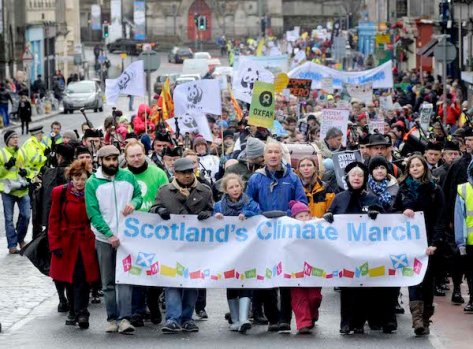I’m interrupting my learning at Climate Change University of Exeter to consider the Scottish Government’s draft Climate Change Plan:
http://www.gov.scot/Publications/2017/01/2768
The consultation ends today 10 February 2017.
http://www.parliament.scot/parliamentarybusiness/CurrentCommittees/103052.aspx
Climate change is already affecting Scotland. However the plan is set firmly in an international context:
“Adapting to the impacts of climate change is a global challenge faced by all countries. The Paris Agreement on climate change links mitigation and adaptation and sets a global goal of reducing vulnerability to climate change. All countries must plan for and take action on adaptation. We will continue to share learning with our counterparts internationally at events such as the third European Climate Change Adaptation Conference to be held in Glasgow in June 2017.”
In Scotland, emissions have fallen by an average of 3.3% per year since 2009. Emissions were cut by 45.8% between 1990 and 2014, exceeding the 2020 target of a 42% cut six years early. Nevertheless, like everywhere else, there is much to do. The Scottish Government intends to publish a new Climate Change Bill later this year. Meanwhile the draft plan considers proposals on the electricity system, transport, the industrial sector, waste, agriculture, Land Use, Land Use Change and Forestry, including peatland and woodland.
There is also a coalition of organisations in Scotland, Stop Climate Chaos Scotland (http://stopclimatechaos.org/), campaigning together on climate change. Its members include environment, faith and international development organisations, trade and student unions and community groups. SCCS published proposals in October 2016 which it wanted to see considered as part of the plan.
Click to access SCCS_ClimateChangePlanRecommendations.2016_0.pdf
SCCS’s role in policy development, scrutiny and promotion is recognised in the draft plan, and it is now providing briefings to the Scottish Government committees who will be considering responses to the consultation.
As for my own response, as well as agreeing with SCCS’s proposals, I believe climate justice is critically important, and this led me to deepen my learning about climate change. The effects of climate change fall on the poorest and most vulnerable people across the world. Internationally it has proved difficult to achieve the required level of pledges needed to address adaptation effectively. In Scotland the Climate Justice Fund is helping to support developing countries and I would like to see the Fund continued and if possible increased as part of the Climate Change Plan, even though the main focus of the plan concerns the reduction of emissions in Scotland.
The draft plan suggests that local government, other public bodies, the private sector, the third sector, and communities and households all have important roles to play in reducing greenhouse gas emissions , and I agree with this. Nevertheless my many years of experience in cross-sectoral working have shown me how difficult it is to achieve effective outcomes through working together, and I believe the Scottish Government has to demonstrate a lead in this, not least through government departments visibly working together to address the plan. The role of the third sector is recognised in the plan and supported through Climate Challenge Fund, but the role of the private sector is not well-developed and appears to need much deeper consideration.
The plan expects that meeting climate change targets will change the Scottish economy by moving the economy’s competitive advantage to low carbon sectors. It also recognises the need to manage this transition to minimise any adverse impacts and maximise the benefits of decarbonisation – sharing the benefits across communities, reducing social inequalities and creating a vibrant climate for innovation. However there also needs to be a clear focus on the need to achieve a “just transition” that recognises where some communities and groups of workers are more affected than others by the transition to a low carbon economy: these are where investment in new skills and working practices will be needed most. Trade unions should be key players in working towards this just transition. In my view the draft plan does not address this: it is perhaps implied in proposals to develop Carbon Capture and Storage (CCS) and in the Low Carbon Infrastructure Transition Programme but certainly not explored in any depth.
There are welcome proposals relating to peatland in the draft plan – not only can well-maintained peatlands act as an effective carbon sink, they can also harbour amazing biodiversity and can promote wellbeing if carefully controlled access is encouraged. More could be done to promote Scotland’s peatlands – it would be wonderful to see them cherished in the same way as our mountains!
The Climate Conversations which have taken place across Scotland already have clearly been helpful in identifying public attitudes and should be continued. The third sector can continue to play a valuable role in promoting awareness about climate change and business leaders could be encouraged to do more. A special effort should be made to engage those communities and groups of workers most affected by the transition to a low carbon economy. This does not seem to have happened so far.
Meanwhile the Scottish Government, through its Greener Scotland adverts, the Scottish Government has been trying to win hearts and minds…

